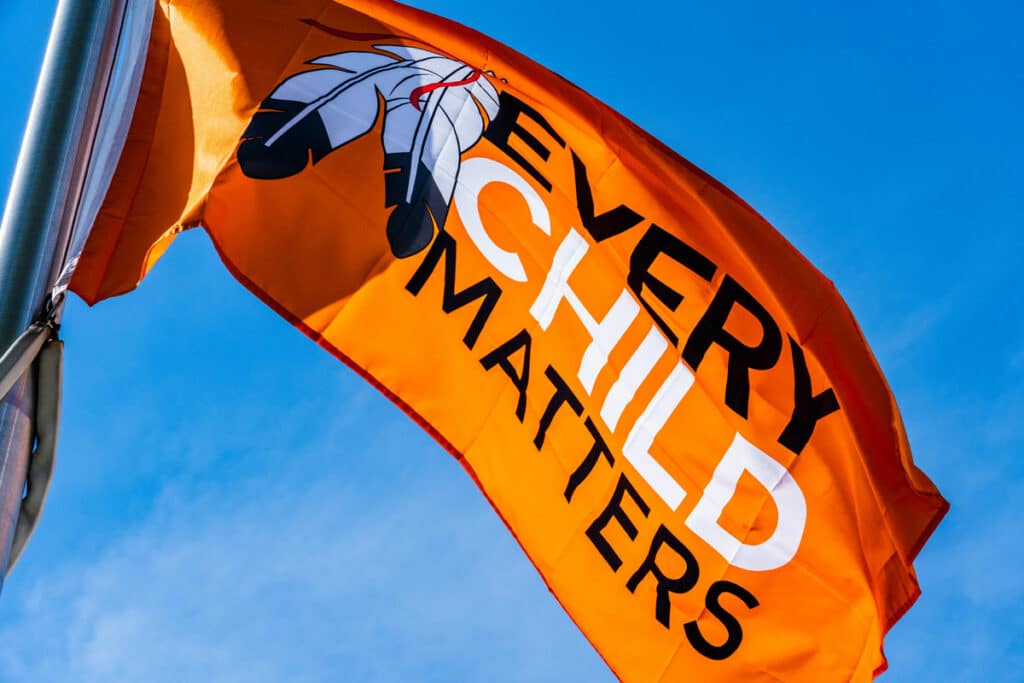
Image © Chris Robert
September 30th marks the commemoration of National Day for Truth and Reconciliation in Canada, also known as Orange Shirt Day. We at bci want to acknowledge the importance of this day and express our continued commitment to Truth and Reconciliation. We’re focused on advocating for decolonization and equity and inclusion for the Indigenous Peoples of this land we now call Canada.
It’s critical that we understand the importance of National Day for Truth and Reconciliation, as it rightfully highlights the ongoing oppression that Indigenous communities experience, including lives lost due to hate, violence and genocide. In the wake of this upcoming commemoration, many Canadians (myself included) have been reflecting on the shared responsibility we have as settlers to promote Truth and Reconciliation and healing work in the workplace.
Those of us who are not Indigenous have a responsibility to call out the continued colonization, oppression, land theft and marginalization that Indigenous Peoples experience. We must work together — both as leaders ourselves but also call upon leaders across sectors — to do more to address the offensive systems that continue to oppress Indigenous Peoples.
At the individual level, each of us must commit to owning our roles in continuing to perpetuate the marginalization and racism that Indigenous Peoples experience. As it relates to DEI in the workplace, we must do more to prioritize inclusion for our Indigenous team members and colleagues, starting with addressing the dramatic systemic problems that prevent Indigenous professionals from accessing opportunities and from thriving.
In this moment, it’s more important than ever that we ramp up our decolonization and DEI efforts for Indigenous communities. As always, at bci we actively advocate for these efforts and stand in solidarity with Indigenous communities across Canada and globally.
Sign up for bci’s mailing list to get the latest diversity, equity and inclusion insights right to your inbox every month.
Komal is bci’s Senior DEI Consultant and Mental Health Expert-in-Residence and an accomplished DEI facilitator, coach, and strategist. Komal has over 20 years of experience in providing strategic and advisory guidance and program development across a range of sectors, with a particular concentration in mental health and racial inclusion. Komal is also the founder of Insayva Inc., a social enterprise focused on providing accessible DEI and health equity support to charities and non-profit organizations.
Komal has extensive experience in creating and delivering programming in a range of leadership and DEI areas, including mental health inclusion, psychological safety, empathy, relationship repair, allyship, and cultural competence. She is passionate about driving transformational change in workplaces and has worked closely with bci clients – corporations, professional service firms, health care providers, and educational institutions – to embed cultures of inclusion within their organizations.
Komal has provided one-on-one inclusion coaching to hundreds of senior leaders and brings a unique approach that is informed by her background as a therapist. She is able to expertly handle sensitive conversations and situations and works with leaders to develop the knowledge and skills necessary to advance racial/ethnocultural, gender, and mental health-related equity across teams and organizations. Komal also offers a performance coaching program designed specifically for BIPOC leaders. This program aims to help BIPOC leaders harness their place, position, and identity to thrive in the workplace and beyond. Komal is a qualified administrator of the Intercultural Development Inventory (IDI).
As bci’s Mental Health Expert-in-Residence, Komal offers tremendous expertise around workplace mental health. As a doctoral trained mental health clinician, certified health executive, and registered social worker, Komal has assisted organizations looking to advance employee mental health inclusion and well-being through offering programming on inclusive dialogue, anti-stigma, burnout prevention, psychological safety, resilience, and self-care. Komal is committed to advancing mental health and wellness across the life course; she currently serves on the board of the Alzheimer’s Society of Ontario and previously served on the boards of Children’s Mental Health Ontario and the YMCA of Greater Toronto.
When Komal is not working, you’ll find her painting, cooking, or snuggling with her cats.